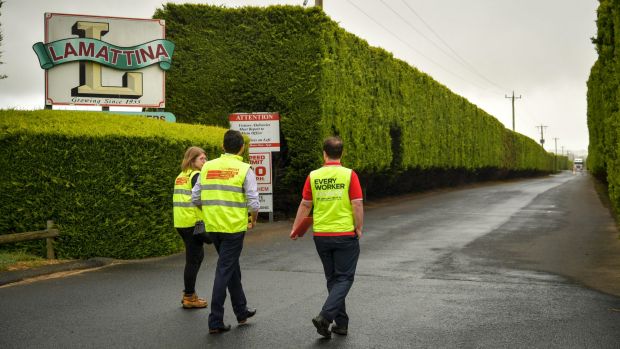A second leading Australian produce supplier to Coles and Woolworths is facing allegations of exploiting illegal migrant workers.
The Mornington Peninsula vegetable farm of high-profile Victorian grower A & G Lamattina & Sons was on Tuesday the scene of a dramatic raid by the National Union of Workers after the Fair Work Commission exercised a rarely used power to allow union officials to demand to see employment records for every worker on the farm.

It is only the second time the FWC has granted the union this power to conduct a raid without notice - the first was in 2010.
Documents show the commission was satisfied the union had good evidence to show workers were being exploited and underpaid at the Mornington Peninsula farm.
The family-owned business grows broccoli, cabbage, carrots, celery, parsnips, silverbeet and lettuce.
"I believe that Lamattina has been systematically underpaying its entire workforce," said NUW organiser Tim Nelthorpe in a sworn statutory declaration.
Late on Tuesday, after an urgent application by the company, the Fair Work Commission agreed to, in effect, suspend the raid after its lawyers provided undertakings that all records will be preserved. It is likely there will be a hearing on December 1.
Barrister Nick Harrington, for the employer, said the company's rights had been "seriously interfered with" and said they were surprised by the raid which came "without any notice".
In a statement, the company said they "believe A&G; Lamattina & Sons Pty Ltd is fully compliant with all regulations and ... are working with Fair Work Australia to investigate these allegations and resolve this matter in the interest of all concerned".
The action at the Lamattina farm came after a joint Fairfax Media and 7:30 program exposed another leading Victorian supermarket supplier, Swan Hill's Cutri Fruit, using underpaid illegal migration workers hired through labour-hire contractors.
The Lamattina and Cutri Fruit revelations will increase pressure on the supermarkets to ensure their supply chains are not tainted by the exploitation of illegal workers.
The Turnbull government's chief migration workforce advisor, Allan Fels, spoke out recently against the "systemic, endemic and rife" exploitation of foreign workers, calling for widespread reforms.
Opposition leader Bill Shorten has seized upon repeated revelations of the underpayment and mistreatment of foreign workers, saying the number of temporary skilled work visas, the 457 subclass, may be pushing local workers out of jobs or driving down conditions.
But he said there was a much broader problem with illegal migrant labour on student and tourist visas.
"Something stinks here," Mr Shorten told Fairfax Media.
"We've got good reason to believe that what we've seen here and at places like 7-Eleven is just the tip of the iceberg ... You have to ask the question why the government is refusing to take action. We know it's being told by its own department that they need greater resources and powers."
The use of illegal migrant workers is a largely hidden problem in the Australian economy, as exposed incase studies reported by Fairfax Media.
In response to Fairfax's investigation, Coles, Woolworths and Costco this week reiterated their strict policies requiring suppliers having a legal workforce that is properly paid.
Coles and Costco have launched investigations into the Cutri Fruit situation, while Woolworths said it would refer allegations about any suppliers to authorities for investigation.
Fairfax Media has spoken to three young Asian men who have recently worked at the Lamattina farm, in breach of their visa conditions. All said they were paid between $12 and $13 per hour, well below the award rate of $22.10 per hour for casual horticultural workers.
The men said they were too scared to speak publicly for fear of deportation. But privately they say there are many workers at the Lamattina farm working in breach of their visa conditions.
Another worker, a woman with a European background, quit her job at Lamattina on the Mornington Peninsula after being repeatedly underpaid.
She said she would receive the correct pay for the first 38 hours of her working week but any overtime was paid in cash at $11 to $12 an hour - well below minimum legal award rates.
The woman said she would often work 50 hours weeks or sometimes as much as 65 hours doing tough physical packing work.
When she complained about the overtime pay it was lifted to a still-illegal $13 an hour.
"I was killing myself for nothing," she said. "(There was) no future, no money."
On her day off, she said "I couldn't get up from the bed, I'm so tired. I was killing myself; my back, my neck too. They didn't appreciate how much we did."
She said one worker received a formal warning for laughing and others were confronted by the owners on suspicion they had joined the union.
"If looks could kill us," she said. "They're never happy, no matter how much we do."
